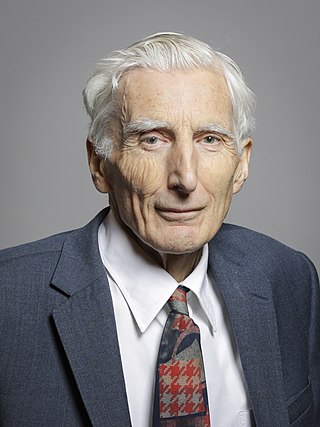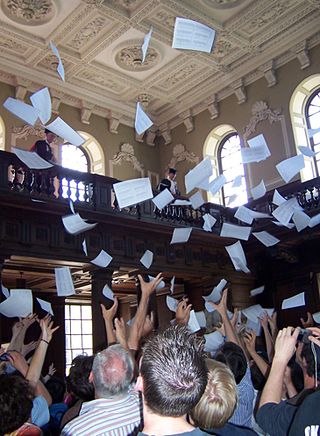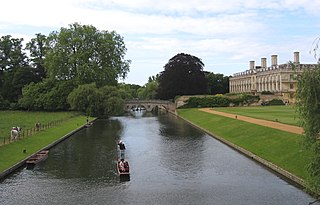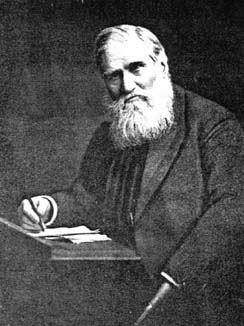Related Research Articles

Trinity College is a constituent college of the University of Cambridge. Founded in 1546 by King Henry VIII, Trinity is one of the largest Cambridge colleges, with the largest financial endowment of any college at either Cambridge or Oxford. Trinity has some of the most distinctive architecture in Cambridge with its Great Court said to be the largest enclosed courtyard in Europe. Academically, Trinity performs exceptionally as measured by the Tompkins Table, coming top from 2011 to 2017. Trinity was the top-performing college for the 2020–21 undergraduate exams, obtaining the highest percentage of good honours.

The University of Cambridge is composed of 31 colleges in addition to the academic departments and administration of the central university. Until the mid-19th century, both Cambridge and Oxford comprised a group of colleges with a small central university administration, rather than universities in the common sense. Cambridge's colleges are communities of students, academics and staff – an environment in which generations and academic disciplines are able to mix, with both students and fellows experiencing "the breadth and excellence of a top University at an intimate level".

St John's College is a constituent college of the University of Cambridge founded by the Tudor matriarch Lady Margaret Beaufort. In constitutional terms, the college is a charitable corporation established by a charter dated 9 April 1511. The full, formal name of the college is the College of St John the Evangelist in the University of Cambridge. The aims of the college, as specified by its statutes, are the promotion of education, religion, learning and research. It is one of the larger Oxbridge colleges in terms of student numbers. For 2022, St John's was ranked 6th of 29 colleges in the Tompkins Table with over 35 per cent of its students earning first-class honours. It is the second wealthiest college in Oxford and Cambridge, after neighbouring Trinity, at Cambridge.

Trinity Hall is a constituent college of the University of Cambridge.

Queens' College is a constituent college of the University of Cambridge. Queens' is one of the older colleges of the university, founded in 1448 by Margaret of Anjou. Its buildings span the River Cam with the Mathematical Bridge and Silver Street connecting the two sides.

Martin John Rees, Baron Rees of Ludlow is a British cosmologist and astrophysicist. He is the fifteenth Astronomer Royal, appointed in 1995, and was Master of Trinity College, Cambridge, from 2004 to 2012 and President of the Royal Society between 2005 and 2010.

Part III of the Mathematical Tripos is a one-year master's-level taught course in mathematics offered at the Faculty of Mathematics, University of Cambridge. It is regarded as one of the hardest and most intensive mathematics courses in the world. Roughly one third of the students take the course as a fourth year of mathematical study at Cambridge after Parts IA, IB, and II of the Mathematical Tripos, whilst the remaining two thirds take the course as a one-year course.
The Adams Prize is one of the most prestigious prizes awarded by the University of Cambridge. It is awarded each year by the Faculty of Mathematics at the University of Cambridge and St John's College to a UK-based mathematician for distinguished research in the Mathematical Sciences.
The Smith's Prize was the name of each of two prizes awarded annually to two research students in mathematics and theoretical physics at the University of Cambridge from 1769. Following the reorganization in 1998, they are now awarded under the names Smith-Knight Prize and Rayleigh-Knight Prize.

The Backs is a picturesque area to the east of Queen's Road in the city of Cambridge, England, where several colleges of the University of Cambridge back on to the River Cam with their grounds covering both banks of the river.
The Faculty of Actuaries in Scotland was the professional body representing actuaries in Scotland. The Faculty of Actuaries was one of two actuarial bodies in the UK, the other was the Institute of Actuaries, which was a separate body in England, Wales and Northern Ireland. While the Faculty of Actuaries and the Institute of Actuaries were separate institutions, they worked very closely together, and the professional qualifications and professional standards for actuaries were identical in each of them. On 25 May 2010, voting members of the Faculty who took part in a ballot voted to merge the Faculty with the Institute of Actuaries, thus creating the Institute and Faculty of Actuaries which came into being on 1 August 2010, superseding the Institute of Actuaries which ceased to exist on that date.
The Mayhew Prize is a prize awarded annually by the Faculty of Mathematics, University of Cambridge to the student showing the greatest distinction in applied mathematics, primarily for courses offered by DAMTP, but also for some courses offered by the Statistical Laboratory, in the MASt examinations, also known as Part III of the Mathematical Tripos. This includes about half of all students taking the MASt examinations, since the rest are taking mainly pure mathematics courses, and so winning the Mayhew Prize is not equivalent to obtaining the highest mark on the MASt examinations. Since 2018 the Faculty have also awarded the Pure Mathematics Prize for pure mathematics, but due to an absence of funds there is no equivalent monetary reward.

The University of Cambridge is a public collegiate research university in Cambridge, England. Founded in 1209, the University of Cambridge is the third-oldest university in continuous operation. The university's founding followed the arrival of scholars who left the University of Oxford for Cambridge after a dispute with local townspeople. The two ancient English universities, although sometimes described as rivals, share many common features and are often jointly referred to as Oxbridge. In 1231, 22 years after its founding, the university was recognised with a royal charter granted by King Henry III.
The Browne Medals are gold medals which since 1774 have been awarded for annual competitions in Latin and Greek poetry at the University of Cambridge.

Thomas Bond Sprague FRSE FFA FIA LLD was a British actuary, barrister and amateur mathematician who was the only person to have been President of both the Institute of Actuaries (1882–1886) in London and the Faculty of Actuaries (1894–1896) in Edinburgh, prior to their merger in 2010.
Julia Rose Gog is a British mathematician and professor of mathematical biology in the faculty of mathematics at the University of Cambridge. She is also a David N. Moore fellow, director of studies in mathematics at Queens' College, Cambridge and a member of both the Cambridge immunology network and the infectious diseases interdisciplinary research centre.

Martin John Dixon is a British academic lawyer. He is Professor of the Law of Real Property at the University of Cambridge and a Fellow of Queens' College, Cambridge. He is Director of the Cambridge Centre for Property Law and an Honorary Bencher of Lincoln's Inn. He was awarded the University of Cambridge Pilkington Prize for excellence in teaching in 2004. He was previously a Fellow of Robinson College, Cambridge and a Legal Officer for the UNRWA based in Vienna and Gaza City.
The Faculty of Economics is one of the constituent departments of the University of Cambridge. It is composed of five research groups, in macroeconomics, microeconomic theory, economic history, econometrics, and empirical microeconomics. It is located in the Sidgwick Site in Cambridge, has been host to many distinguished economists, and is regarded as the birthplace of macroeconomics. 19 students or members of the faculty have won the Nobel Memorial Prize in Economic Sciences.
References
- ↑ "External Notices - Cambridge University Reporter 6273". www.admin.cam.ac.uk. Retrieved 30 July 2019.
- ↑ "Statistical Laboratory". www.statslab.cam.ac.uk. Retrieved 30 July 2019.
- ↑ "Social news round-up - August 2012 | The Actuary, the official magazine of the Institute and Faculty of Actuaries" . Retrieved 30 July 2019.
